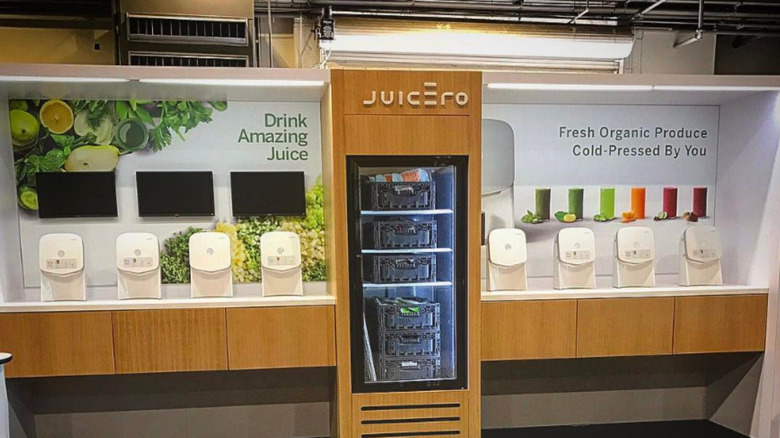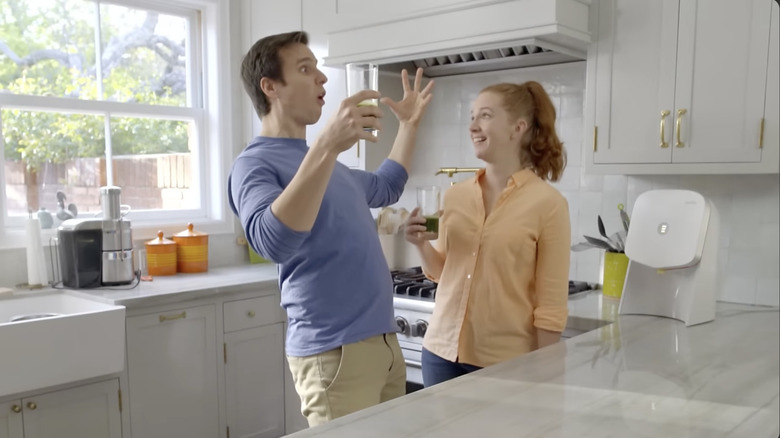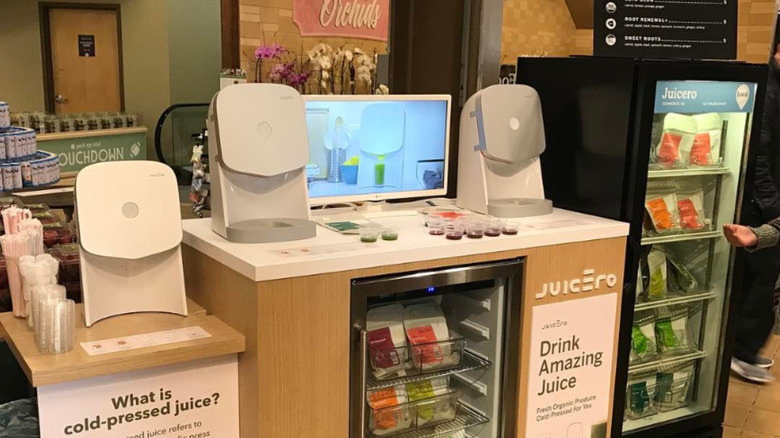Whatever Happened To The Ridiculous $400 Juicero?
Some inventions are earth shattering: the wheel, the light bulb, the personal computer. They change the course of the world and become indispensable to our daily lives. And then there's the Juicero. Although society was in the midst of a juicing craze when the company emerged in March of 2016, Juicero was no proverbial sliced bread (despite the fact that innovative is exactly what it claimed to be). It did launch to much fanfare and investor excitement — but was gone after only 16 months.
The company was founded by Doug Evans, former CEO of a chain of health food stores called Organic Avenue, who invented a machine that many compared in concept to a Keurig. Forget homemade green juices — all you had to do was put a special package of chopped fruits and vegetables into a sleek, white press, hit the button, and let it produce healthy, nutrient-rich, mess-free juices with what Evans claimed was enough force to lift two Teslas. It had an app that let you scan a QR code to learn about ingredients and get alerted to recalls. It was Wi-Fi enabled. It would order more produce pouches for you. And you only had to pay $700 (plus a juice package subscription) for the privilege of using this technological marvel. That price was quickly discounted to $400, but the public still decided that it just wasn't their cup of tea — well, juice — and Juicero couldn't survive.
Juicero started like a Silicon Valley fairytale
The launch of Juicero was highly anticipated. The likes of The Campbell's Company, Google Ventures, and Kleiner Perkins backed it, and alongside a bevy of other investors, made it one of 2016's top-funded hardware startups in the United States — throughout the company's brief existence, it raised around $120 million. Doug Evans initially raised funds using only a 3D-printed model rather than an actual prototype, but this was no careless, garage-born appliance. Jony Ive and Yves Béhar, both of whom designed for Apple, helped create the Juicero's Apple-esque look.
The produce packets themselves were marketed as easy to use, entirely organic, additive-free, and delivered fresh straight from the farm. While you couldn't use the juicer with your own fruits and vegetables, it was no mess and all-natural. Health-focused celebrities like Gwyneth Paltrow and Dr. Oz were riding that green juice high and offered their endorsements.
From top to bottom, the concept was a venture capitalist's darling. Individual consumers and businesses alike would purchase the delightfully high-tech machine, then continue to spend on the separate produce pouches. With the cold-pressed juice trend in full swing and subscription-based services seeing profits, the company seemed destined for Silicon Valley success. But then the shiny, futuristic facade fell away — at the (literal) hands of consumers and a single news article.
A machine outperformed by human hands
The problem was the Juicero itself. Bloomberg News reported, in a now-infamous article from April of 2017, that two Juicero investors complained about the machine's design — it was bigger than what they had been promised. More importantly, though, it seemed entirely unnecessary. Despite the much-lauded strength of the juice press, a consumer could just squeeze the juice out of the pouch themselves by hand. It might not have been quite as efficient (the machine could get a little more juice out) and it might have been slightly messier, but it could be done and you didn't have to pay hundreds of dollars for the appliance.
Well, actually, you did. The produce pouches weren't sold on their own. So, you paid the discounted $400 for a service that your own appendages could do for free.
That article and its accompanying video of hand-pressing juice pouches was the beginning of the end. In the wake of the story, a quarter of the Juicero staff were let go and the company announced that it was planning to discount the appliance again to $200. Even so, in the beginning of September 2017, the very last produce packets were mailed and customers were offered the chance to claim a refund on their now-defunct machine. Thus, Juicero faded into laughable Silicon Valley legend.



